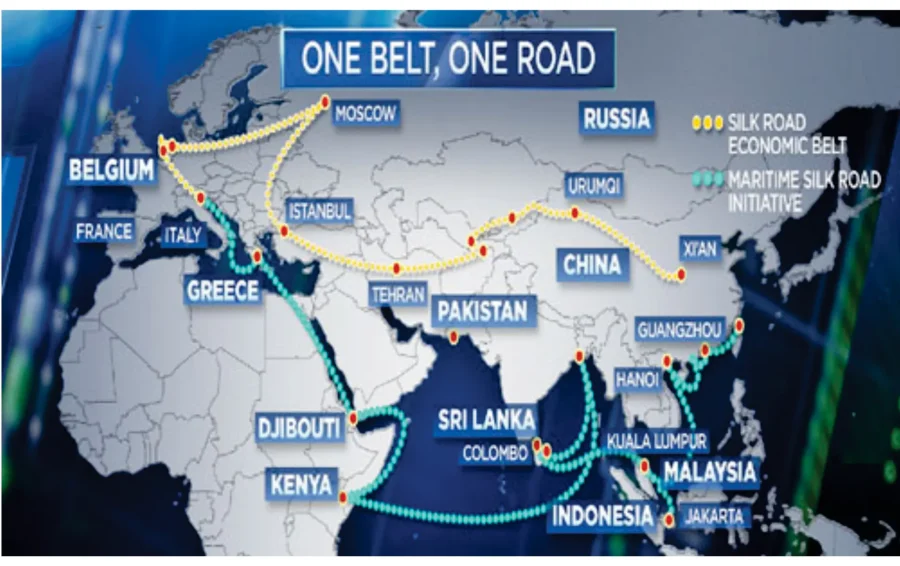The Chinese Belt and Road Initiative (BRI) has completed its first ten years. During this decade, it remained an ideal global cooperation platform and strategic vision of China for global development and offering remedial resolution to the reform of the global governance system and multi-faceted challenges.
While delivering a keynote speech at the Indonesian Parliament in 2013, the Chinese President Xi Jinping, put forward the 21st Century Maritime Silk Road for the first time which clubbed with the proposal of the Silk Road Economic Belt constitutes the original sketch of BRI.
Critical analysis reveals that the BRI cooperation between China and Indonesia has delivered value across a number of industries, including infrastructure, investment, trade, tourism and maritime partnership which have now become a model for mutually beneficial cooperation and joint development among other developing countries.
Moreover, the BRI succeeded in establishing a large-scale and comprehensive program of infrastructure development in the countries along the land and maritime routes. Undoubtedly, BRI remained a path of peace and cooperation, openness and inclusivity, mutual learning and mutual benefit between the countries during the first decade.
On its part, China constantly upholds a cooperative disposition that will yield mutual benefits. The Indonesian government recognizes the significance of regional connectivity and investment in accelerating the country’s economic growth and infrastructure development and thus BRI has been positively contributing to the national economy of Indonesia.
Economically, Indonesia is one of the largest economies in Southeast Asia and has experienced robust economic development since the inception of BRI. Through business-friendly policies and structural reforms, the Indonesian government has worked to increase investment and economic growth. The BRI is viewed as an opportunity to increase regional connectivity, enhance trade, and improve Indonesia’s infrastructure.
Politically, Indonesia has experienced a series of relatively stable leadership transitions. In 2013, Susilo Bambang Yudhoyono was interested in expanding economic partnerships with other countries, especially China, in order to expedite infrastructure development and close development disparities between different Indonesian regions. When President Joko Widodo led the government in the next term, he also envisioned Indonesia to become a “World Maritime Axis (WMA).” Thus there has not been any political indifference leading towards any policy shift about the BRI in Indonesia.
During last year, at the 2022 G20 Bali Summit, Xi and Widodo inked numerous mutual cooperation documents between two countries which consisted of a Joint Promotion Cooperation Plan within the World Maritime Axis Framework and the Belt and Road Initiative, a Memorandum of Understanding on the Joint Development of Conservation/Research Centers and Innovation of Indonesian-China Medicinal Plants, Memorandum of Understanding on Vocational Training in the Industrial Sector, Memorandum of Understanding on Increasing Digital Economic Cooperation, and Agreement on Further Expansion and Deepening of Bilateral Economic and Trade Cooperation vividly reflecting increasing diverse cooperation.
Hopefully, China and Indonesia’s inclusive economic cooperation, transfer of technology and knowledge, infrastructure and connectivity, cultural and educational exchanges can serve as a model for mutually beneficial cooperation and joint development among other developing countries.
Indonesia has received investment from China to build and improve infrastructure in the country. Additionally, funding has also been allocated for the construction of ports, toll roads, airports and energy initiatives. The two countries have signed agreements and begun large-scale projects, including the Jakarta-Bandung High-speed Railway (HSR). Numerous Chinese companies have invested in infrastructure, energy, manufacturing, and tourism in Indonesia via BRI. This investment has contributed to the positive impact on Indonesia’s economic growth and employment creation.
Moreover, port development, maritime cooperation and the expansion of maritime connectivity have been the key sectors of the BRI. It entails the development of Kendal Port in Central Java and Malacca Straits cooperation.
The Jakarta-Bandung high-speed rail cooperation has exhibited a number of observable aspects. This project is an ambitious infrastructure transportation endeavor. It also employs Chinese high-speed train technology. This affords Indonesia the chance to acquire knowledge and experience in the operation and maintenance of an advanced high-speed railway system. It is also anticipated to increase regional tourism. By shortening the travel time, the project enables tourists to visit tourist destinations along the fast train route, such as Puncak, Bandung and its environs. This can have a positive impact on the growth of the tourism sector and the regional economy.
In summary, while visiting China Chengdu Windodo met with Xi. Both leaders summarized the achievements of the 10-year comprehensive strategic partnership during the important meeting, and laid a solid foundation for future cooperation. The collaboration between China and Indonesia has created a new model of South-South Cooperation (SSC), fostering mutual help and mutual learning for common development.
This year marks the 10th anniversary of the establishment of the comprehensive strategic partnership between China and Indonesia. Xi ensured deepening of strategic cooperation with Indonesia, set an example for developing countries of sharing a common future, pursuing solidarity and cooperation and boosting common development and injecting more certainty and positive energy into the region and the world.
China is willing to maintain regular strategic communication with Indonesia, strengthen the exchanges of state governance experience, initiate the “2+2” dialogue mechanism for foreign and defense ministers of the two countries and build high-level strategic mutual trust. China is also willing to continue to expand imports of bulk commodities and high-quality agricultural products from Indonesia, deliver on the Regional Comprehensive Economic Partnership, and strengthen cooperation in fields including food security, poverty reduction, rural revitalization, vocational education, language education, medicine and health, culture and tourism.
It is suggested that Indonesian government should seek assistance from the Chinese government to build its new capital and the North Kalimantan Industrial Park, new energy vehicles and smart cities and jointly promotion of the industrial digital transformation along with exploring prospects of cooperation in Islamic Finance/Banking, last but not least, blue/green hydrogen power generation, solar/wind energy cooperation and lithium batteries under the flagship project of the BRI.










